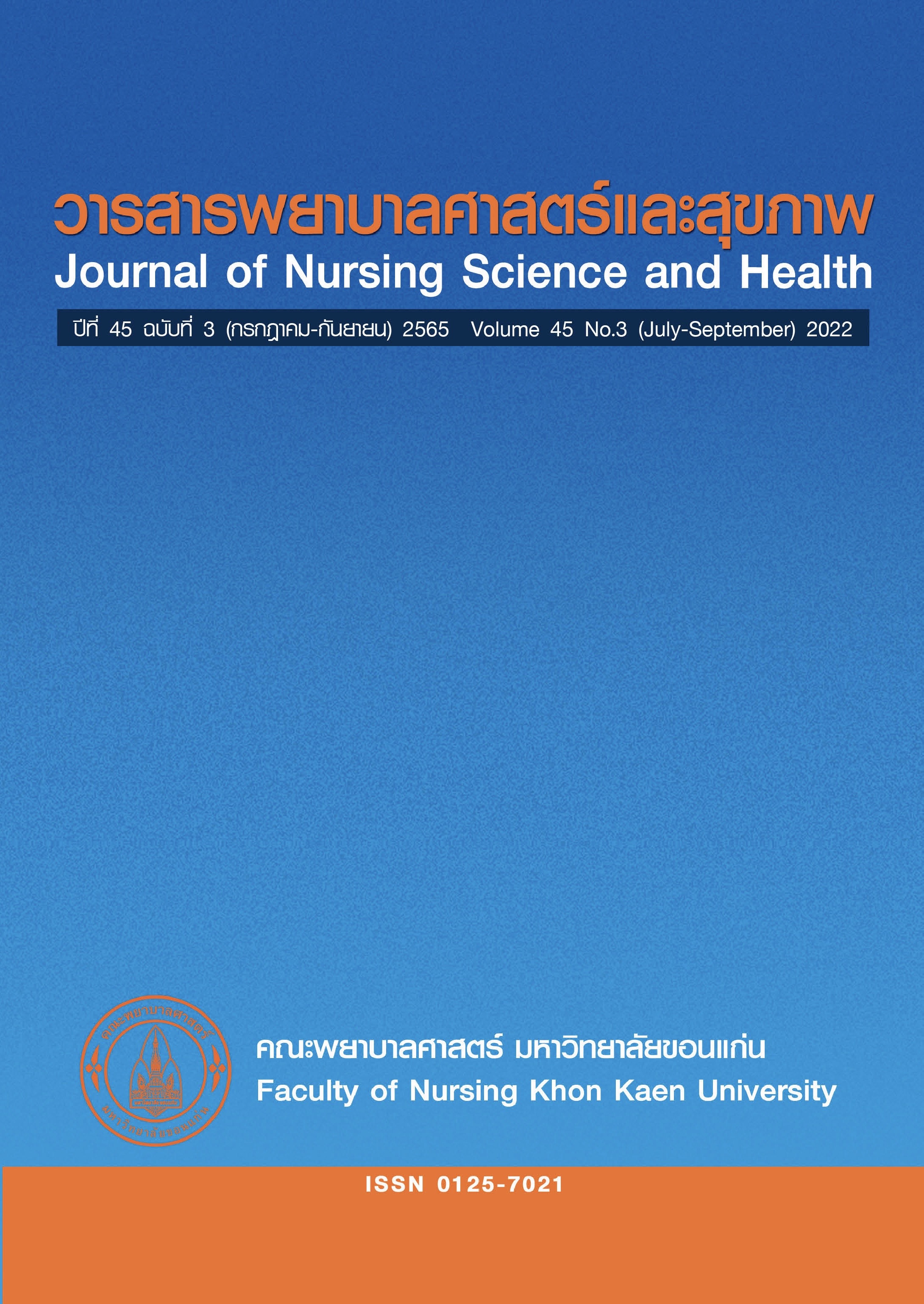เมืองแตก...สาแหรกไม่ขาด: การศึกษาเชิงคุณภาพถึงกลยุทธ์การรอดพ้นจากภาวะวิกฤตของครอบครัวผ่านการสืบทอดคุณค่าทางวัฒนธรรมของชาวเวียดนามอพยพในประเทศไทย
คำสำคัญ:
กลยุทธ์การรอดพ้น, การศึกษาเชิงคุณภาพแบบชาติพันธ์วรรณา , การสืบทอดคุณค่าทางวัฒนธรรม , ครอบครัวในภาวะวิกฤต , ชาวเวียดนามอพยพบทคัดย่อ
สังคมปัจจุบันมีความซับซ้อนและยุ่งยากให้สมาชิกครอบครัวต้องแบกรับภาระกิจ เพื่อเติมเต็มในทุกบทบาทและหน้าที่ ส่งผลต่อสถาบันครอบครัวเกิดความอ่อนแอเปราะบางจนเกิดวิกฤตของครอบครัวและสังคม
การศึกษาเชิงคุณภาพแบบชาติพันธ์วรรณานี้มีวัตถุประสงค์เพื่อศึกษาประสบการณ์และกลยุทธ์ในการรับมือต่อภาวะวิกฤตทางชนชาติในสังคมที่เผชิญของครอบครัวเวียดนามอพยพในจังหวัดนครพนม เก็บข้อมูลโดยการทบทวนเอกสาร การสังเกตในชุมชน สัมภาษณ์เชิงลึก และการบันทึกภาคสนาม ผู้ให้ข้อมูลเป็นสมาชิกครอบครัวเวียดนามอพยพและเพื่อนสนิทรวม 20 คน ในชุมชนชาวเวียดนามแห่งหนึ่งในจังหวัดนครพนม
พบข้อมูลที่สะท้อนวิถีการเผชิญปัญหาวิกฤตโดยยึดมั่นในจิตวิญญาณทางวัฒนธรรมดั้งเดิมของชาวเวียตนาม แก่นความคิดที่ได้จากการวิเคราะห์เนื้อหา คือ “สร้างสิ่งยึดมั่น” ทั้งรูปธรรม และ นามธรรม ดังนี้ 1) การสร้างศาลเจ้าบูชาในหมู่บ้าน 2) การตั้งหิ้งบูชาบรรพบุรุษและ การเชิดชูวีรบุรุษโฮจิมินห์ ข้อค้นพบนี้สามารถนำไปประยุกต์ใช้ในการวางแผนการดูแลครอบครัวที่ต้องเผชิญภาวะวิกฤตและออกแบบโปรแกรมเพื่อช่วยให้สมาชิกครอบครัวที่เป็นผู้รับบริการมีพลังจิตและมีการรับรู้ทางบวก อาจเป็นประโยชน์และเป็นอีกทางเลือกหนึ่งในการส่งเสริมให้ครอบครัวบรรเทาและผ่านพ้นภาวะวิกฤตนั้นได้
เอกสารอ้างอิง
Jongsatithsatien J. Sustainable and economic tourism management based on the community participation: A case study of Ban Na Jok, Nakhon Phanom province. [thesis]: Phitsanulok, Naresuan University; 2010. (in Thai)
WHO. The work of WHO 1978-!979. Geneva: The WHO office; 1978 [cited 2022 Jan 25]. Available from: https://apps.who.int/iris/bitstream/handle/10665/204174/9241560630 _eng.pdfsequence=1
Hui G. Muenmanuspracha and Ban Najok: The last record before disappearing, part 1, after the establishment of Ban Najok.[Internet] 2022 [cited 2022 Apr 5]. Available from: https:// www.bloggang.com/m/viewdiary.php?id=peeradol33189&month=06-2018&date=20& group=6&gblog=80. (in Thai)
Donsom J. Creating ethnic identity of Vietnamese immigrants at Ban Najok, Nong Yat sub-district, Mueang district, Nakhon Phanom province. [thesis]. Khon Kaen: Khon Kaen University; 2008. (in Thai)
Nilthirach W, Jongudomkarn D. The live experience in the family as perceived by Phu-Tai elderly women: A qualitative study. JNSH 2019;42(4):30-9. (in Thai)
Burusphat K. Vietnamese immigrants. Bangkok: Charoenwit Printed; 1978, p.2. (in Thai)
Jongudomkarn D. Family health nursing: Concept and theory implications for crisis intervention. 4th ed. Khon Kaen: Khlangnanawitaya; 2021. (in Thai)
Atkinson JD. Qualitative methods. In: editor, Journey into social activism: Qualitative, approaches. New York: Fordham University Press; 2017[cited 2022 Apr 15], p.65–98. Available from: http://www.jstor.org/stable/j.ctt1hfr0rk.6
Binh VTD, Jongudomkarn D, Phuong NTA. Health needs assessment of the elderly with chronic diseases in Thuy Chau Ward, Huong Thuy Town, Vietnam. IJMRAP 2020;3(4):47-51.
Allen M. The sage encyclopedia of communication research methods. 4th ed. Thousand Oaks, CA: SAGE Publications; 2017 [cited 2022 Apr 25]. doi:10.4135/9781483381411
Holloway I, Wheeler S. Qualitative research in nursing. 2nd ed. Oxford, UK: Black; 2002.
Morse JM. Designing qualitative research. In: Denzin K, Lincoln YS, editors, Handbook of qualitative inquiry. Thousand Oaks CA: Sage; 1994:p.220-35.
Morse JM, Field PA. Nursing research: The application of qualitative approaches 2nd ed. Cheltenham, UK: Nelson Thornes; 2002.
Jaisa-ard S. Book reviews: Kiobao-Najok overseas at Ban Najhok. Journal of the Mekong Society 2006;2(3):151-8. (in Thai)
Jongudomkarn D, Phupaibul R, Kumhom R, Tejagupta C, Wacharasin C, Deoisres W, et al. Perceptions of the Thai family well-being: A qualitative study. JNSH 2017;40(1):14-29. (in Thai)
Satsanguan Ng. Family institute of ethnic groups in Bangkok: A case study of Vietnamese family. Bangkok: King Prajadhipok's printing house;2002:p.133. (in Thai)
Jeerapat W. Resolving problems of ethnic minorities in Thailand: A case study of Vietnamese immigrants. Bangkok: King Prajadhipok's printing house;1996:p.15. (in Thai)
Visalo P, Wanliphodom S. Family forum on "Buddhist doctrine and the solution of Thai family crisis". Khao Sod newspaper. Aug 12, 2007. Retrieved: April 5, 2022, Available from: http://www.notgoodstory.com/stden/show_std.php?stdid=2496. (in Thai)
Schock-Giordano AM. Ethnic families and mental health: Application of the ABC-X model of family stress. SAGE Open 2013;1-7. doi:10.1177/2158244013478015.
Smith SR, Hamon RR, Ingoldsby BB, Miller JE. Exploring family theories. 2nd ed. New York: Oxford Univ; 2009.
ดาวน์โหลด
เผยแพร่แล้ว
รูปแบบการอ้างอิง
ฉบับ
ประเภทบทความ
สัญญาอนุญาต
ลิขสิทธิ์ (c) 2022 วารสารพยาบาลศาสตร์และสุขภาพ

อนุญาตภายใต้เงื่อนไข Creative Commons Attribution-NonCommercial-NoDerivatives 4.0 International License.
วารสารพยาบาลศาสตร์และสุขภาพเป็นเจ้าของลิขสิทธิ์ในการเผยแพร่ผลงานที่ตีพิมพ์ห้ามผู้ใดนำบทความที่ได้รับการตีพิมพ์ในวารสารพยาบาลศาสตร์และสุขภาพไปเผยแพร่ในลักษณะต่าง ๆ ดังนี้ การนำบทความไปเผยแพร่ออนไลน์ การถ่ายเอกสารบทความเพื่อกิจกรรมที่ไม่ใช่การเรียนการสอน การส่งบทความไปตีพิมพ์เผยแพร่ที่อื่น ยกเว้นเสียแต่ได้รับอนุญาตจากวารสารพยาบาลศาสตร์และสุขภาพ



